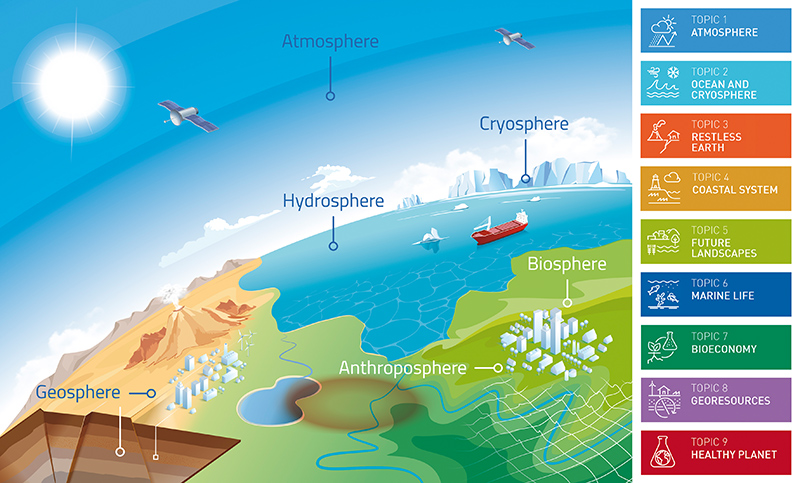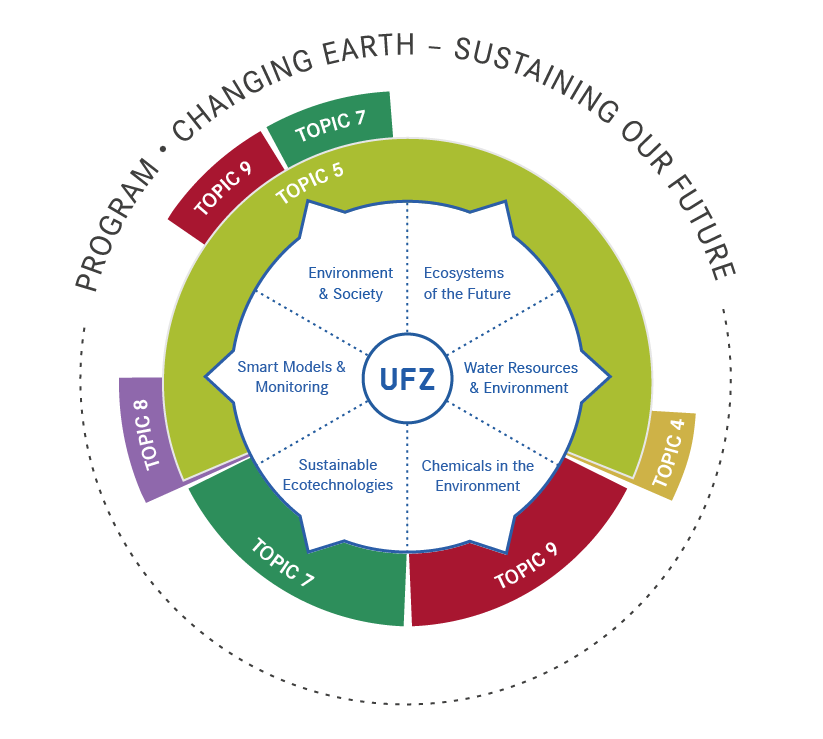Our research program 2021–2027
"Changing Earth - Sustaining our Future"
7 Helmholtz Centres, 7 years – 1 program: „Changing Earth - Sustaining our Future“

Climate change, the extinction of species, environmental pollution, and geological risks are among the greatest challenges of our time. In the program "Changing Earth - Sustaining our Future", the UFZ and the six other Helmholtz Centres of the Research Field "Earth and Environment" are researching our natural environment – from the land surface and the oceans to the most remote polar regions.
After all, it will only be possible to plot a course into a sustainable future with in-depth knowledge of the Earth system, innovative technologies, strategic solutions, and recommended actions for policymakers. In the joint program "Changing Earth - Sustaining Our Future", the UFZ combines its expertise with that of the participating partner centres.
We have therefore organized our research areas into nine topics as well as numerous cross-cutting activities and alliances. Our aim is to pool the knowledge generated through this work and promote cooperation between Helmholtz Centres and with national and international partners. To make sure that our research findings are brought to public attention and are able to influence developments in society, we have set up a synthesis and communication platform.
Five of the nine topics are decisive for our research at the UFZ, two of which are coordinated at the UFZ. As an environmental research centre, we contribute our expertise to program research in the natural, engineering and social sciences as well as the infrastructure we operate in the six UFZ research units "Ecosystems of the Future", "Water Resources and Environment", "Chemicals in the Environment", "Environmental Engineering and Biotechnology", "Smart Models / Monitoring" and "Environment and Society".
The seven Helmholtz Centres involved in the research program "Changing Earth - Sustaining our Future"
- Alfred-Wegener-Institute - Helmholtz Centre for Polar and Marine Research
- Forschungszentrum Jülich
- GEOMAR Helmholtz Centre for Ocean Research Kiel
- Helmholtz-Zentrum hereon
- Helmholtz Centre for Environmental Research - UFZ
- Helmholtz Centre Potsdam - GFZ German Research Centre for Geosciences
- Karlsruher Institute of Technology
The integration of the topics into the UFZ research structure
The UFZ is involved in a total of five topics. Topic 5 ("Landscapes of the Future: Securing Terrestrial Ecosystems and Freshwater Resources under Natural Dynamics and Global Change") and Topic 9 ("Healthy Planet - Towards a Non-Toxic Environment") are coordinated by the UFZ.

List of topics with UFZ participation

Topic 4: Coastal Transition Zones under Natural and Human Pressure
Coordination: HZG
Speaker: Daniela Jacob, Contact
Participating Helmholtz Centres: AWI | HEREON | UFZ

Landscapes of the Future: Securing Terrestrial Ecosystems and Freshwater Resources under Natural Dynamics and Global Change
Coordination: UFZ
Speaker: Sabine Attinger, Contact
Participating Helmholtz Centres: AWI | GFZ | HEREON | UFZ

Towards a Sustainable Bioeconomy – Resources, Utilization, Engineering and AgroEcosystems
Coordination: FZJ
Speaker: Michael Bott,
Kontakt
Participating Helmholtz Centres: AWI | FZJ | KIT | UFZ

Georesources for the Energy Transition and High-tech Society
Coordination: GFZ
Speaker: Sarah Gleeson, Contact
Participating Helmholtz Centres: GEOMAR | GFZ | UFZ

Healthy Planet - Towards a Non-Toxic Environment
Coordination: UFZ
Speaker: Beate Escher, Contact
Participating Helmholtz Centres: UFZ
